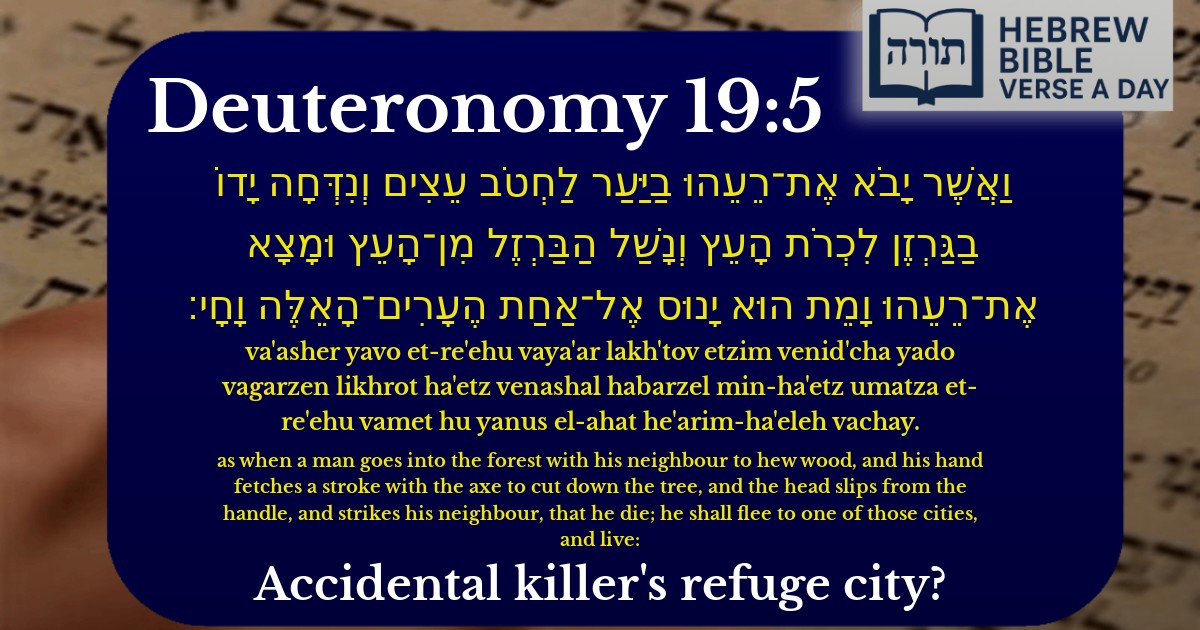Join Our Newsletter To Be Informed When New Videos Are Posted
Join the thousands of fellow Studends who rely on our videos to learn how to read the bible in Hebrew for free!
Hebrew Text
וַאֲשֶׁר יָבֹא אֶת־רֵעֵהוּ בַיַּעַר לַחְטֹב עֵצִים וְנִדְּחָה יָדוֹ בַגַּרְזֶן לִכְרֹת הָעֵץ וְנָשַׁל הַבַּרְזֶל מִן־הָעֵץ וּמָצָא אֶת־רֵעֵהוּ וָמֵת הוּא יָנוּס אֶל־אַחַת הֶעָרִים־הָאֵלֶּה וָחָי׃
English Translation
as when a man goes into the forest with his neighbour to hew wood, and his hand fetches a stroke with the axe to cut down the tree, and the head slips from the handle, and strikes his neighbour, that he die; he shall flee to one of those cities, and live:
Transliteration
Va'asher yavo et-re'ehu vaya'ar lakh'tov etzim venid'cha yado vagarzen likhrot ha'etz venashal habarzel min-ha'etz umatza et-re'ehu vamet hu yanus el-ahat he'arim-ha'eleh vachay.
Hebrew Leining Text
וַאֲשֶׁר֩ יָבֹ֨א אֶת־רֵעֵ֥הוּ בַיַּ֘עַר֮ לַחְטֹ֣ב עֵצִים֒ וְנִדְּחָ֨ה יָד֤וֹ בַגַּרְזֶן֙ לִכְרֹ֣ת הָעֵ֔ץ וְנָשַׁ֤ל הַבַּרְזֶל֙ מִן־הָעֵ֔ץ וּמָצָ֥א אֶת־רֵעֵ֖הוּ וָמֵ֑ת ה֗וּא יָנ֛וּס אֶל־אַחַ֥ת הֶעָרִים־הָאֵ֖לֶּה וָחָֽי׃
Parasha Commentary
📚 Talmud Citations
This verse is quoted in the Talmud.
📖 Makkot 7b
The verse is discussed in the context of the laws regarding the cities of refuge (arei miklat) and the circumstances under which one is exiled there for unintentional killing.
📖 Sanhedrin 45b
The verse is referenced in a discussion about the legal implications of accidental killing and the distinction between intentional and unintentional acts.


Context in the Torah
This verse (Devarim 19:5) discusses the laws of an unintentional killer who must flee to an ir miklat (city of refuge) to escape the go'el hadam (blood avenger). The scenario describes an accidental death caused during a mundane activity—chopping wood—emphasizing that even ordinary actions require caution.
Rashi's Explanation
Rashi (Devarim 19:5) highlights the phrase "וְנִדְּחָה יָדוֹ בַגַּרְזֶן" ("his hand fetches a stroke with the axe") and explains that this implies the act was unintentional (shogeg). The Torah uses the term "נִדְּחָה" (driven or forced) to indicate that the killer had no malicious intent. Rashi also notes that the verse specifies "בַיַּעַר" (in the forest) to exclude cases where the act occurred in a public domain, which might imply negligence.
Rambam's Legal Analysis
In Hilchos Rotzeach U’Shemiras Nefesh (5:1), the Rambam codifies this law, stating that accidental killing due to negligence (e.g., improper handling of tools) still requires exile to a city of refuge. However, if the act was entirely beyond the person’s control (e.g., the axe head flew off due to a hidden defect), some opinions hold that exile may not be necessary.
Talmudic Discussion
The Gemara (Makkos 7b) analyzes this verse to derive principles about unintentional killing:
Midrashic Insight
The Midrash Tanchuma (Mishpatim 8) connects this verse to the broader theme of hashgacha pratis (divine providence). Even in seemingly random accidents, there is a hidden divine decree, and the city of refuge serves as both a punishment and a refuge for spiritual introspection.
Halachic Implications
This verse establishes key principles in Jewish law: